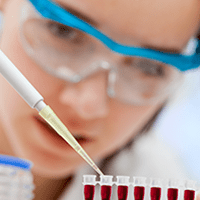Genetics of gender identity
Genetics of gender identity is a Research Project for the Sex Development Research Group, under the Centre for Endocrinology and Metabolism.
Project Leader
Gender identity is the gender with which a person identifies. Studies suggest that prenatal hormonal or postnatal social determinants affect gender identity. This project is investigating the role of genes in patients with gender identity disorders. Currently, the team is undertaking genetic association studies of steroidogenesis genes in a large cohort of male-to-female transsexuals.
From a very early age, people develop an inner sense of being male or female. However, some individuals develop a strong cross-gender identity often described as being trapped in the wrong body. Commonly referred to as transexualism, this condition leaves many patients in significant distress because they feel that their anatomic traits do not reflect their true gender identity. We know little about the aetiology of transsexualism.
Several case reports on co-occurrence of transsexualism in families raised the question of whether gender identity is heritable. Genetic studies of girls with congenital adrenal hyperplasia, and polycystic ovarian syndrome point to excess androgen activity as related to the higher incidence of male gender role behaviour.
A molecular understanding of gender identity will also aid in sex reassignment decisions in children born with disorders of sex development, such as ambiguous genitalia.
Transsexuals often describe feeling trapped in a body with the wrong gender, a condition that appears linked to how strongly the brain’s hypothalamus responds to testosterone. A major genetic study of male-to-female transsexuals undertaken at PHI was the first to identify a small difference in the androgen receptor (AR) gene, located on the X-chromosome, which is more prevalent among transsexuals. An ongoing investigation, including a study involving the world’s largest cohort, will assist our researchers to identify other genes that may be associated with the condition.
Selected publications
Hare L, Bernard P, Sánchez FJ, Baird PN, Vilain E, Kennedy T, Harley VR (2009) Androgen receptor repeat length polymorphism associated with male-to-female transsexualism. Biological Psychiatry 65: 93-96.



